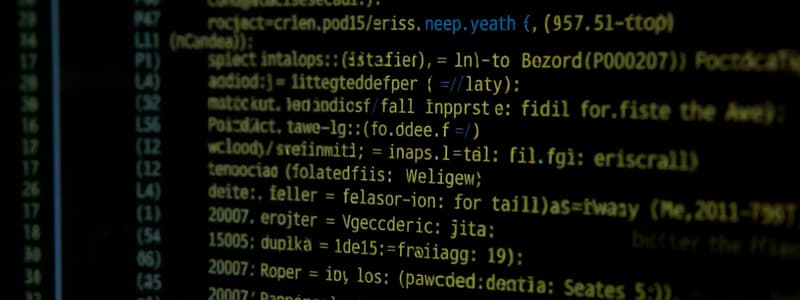Podcast
Questions and Answers
What is one of the primary advantages of using functions in programming?
What is one of the primary advantages of using functions in programming?
- Functions help in making the code easier to debug. (correct)
- Functions can reduce the total number of lines in a program.
- Functions increase the program's execution speed significantly.
- Functions can only be defined within the main function.
What is the proper syntax for defining a function that returns an integer and takes an integer parameter?
What is the proper syntax for defining a function that returns an integer and takes an integer parameter?
- function int func(int parameter) { statements; }
- def int func(int parameter) { statements; }
- int func(parameter int) { statements; }
- int func(int parameter) { statements; } (correct)
Which statement about function prototypes is true?
Which statement about function prototypes is true?
- Function prototypes are required for all functions irrespective of their position in the program.
- Only functions that return void require prototypes.
- Function prototypes are not necessary if the function definition appears before the call. (correct)
- All function prototypes must include variable names.
How do you correctly declare a function that takes a character and an integer as parameters?
How do you correctly declare a function that takes a character and an integer as parameters?
What would be the result of the following code snippet: 'int func (int n) { return n; } int main() { int t; t = func(5); return 0; }'?
What would be the result of the following code snippet: 'int func (int n) { return n; } int main() { int t; t = func(5); return 0; }'?
What does it mean that variables defined within a function are local?
What does it mean that variables defined within a function are local?
Which statement is true regarding function calls?
Which statement is true regarding function calls?
In function definitions, what does the term 'void' signify?
In function definitions, what does the term 'void' signify?
What is the result of calling 'sqrt(4)' given the prototype 'double sqrt(double);'?
What is the result of calling 'sqrt(4)' given the prototype 'double sqrt(double);'?
What are function headers primarily used for?
What are function headers primarily used for?
What is a key characteristic of a function in programming?
What is a key characteristic of a function in programming?
What does the function prototype 'double sqrt(double);' specify?
What does the function prototype 'double sqrt(double);' specify?
What will happen if a function is called that is not defined earlier in the program without a prototype?
What will happen if a function is called that is not defined earlier in the program without a prototype?
What is the purpose of parameters in a function?
What is the purpose of parameters in a function?
What is the effective method to return multiple values from a function?
What is the effective method to return multiple values from a function?
When a function is called, what is the sequence of operations on the parameters?
When a function is called, what is the sequence of operations on the parameters?
Which keyword would be used when a function does not return any value?
Which keyword would be used when a function does not return any value?
What type of access do functions have to variables defined outside of them?
What type of access do functions have to variables defined outside of them?
What is the typical use of a function declaration in programming?
What is the typical use of a function declaration in programming?
Which of the following is true regarding function scope?
Which of the following is true regarding function scope?
What must be included at the beginning of a C program if function prototypes are used?
What must be included at the beginning of a C program if function prototypes are used?
What will happen if a function is called with parameters of incorrect types?
What will happen if a function is called with parameters of incorrect types?
In the context of functions, what is the significance of the 'return' statement?
In the context of functions, what is the significance of the 'return' statement?
Which of the following statements is true about local variables in a function?
Which of the following statements is true about local variables in a function?
Which of the following correctly describes a function prototype?
Which of the following correctly describes a function prototype?
What is the primary benefit of defining functions in a program?
What is the primary benefit of defining functions in a program?
What happens if a function with no parameters is declared but defined with parameters?
What happens if a function with no parameters is declared but defined with parameters?
When passing multiple parameters to a function, how are they separated in the function header?
When passing multiple parameters to a function, how are they separated in the function header?
Which scenario correctly demonstrates the use of the 'void' return type?
Which scenario correctly demonstrates the use of the 'void' return type?
In the function definition 'int fact(int n)', what does 'int' denote?
In the function definition 'int fact(int n)', what does 'int' denote?
Flashcards are hidden until you start studying
Study Notes
Functions Overview
- A function is a modular program segment that performs a specific task.
- Advantages of using functions include:
- Enhanced program modularity through smaller code segments.
- Promotion of structured programming.
- Simplified debugging process.
- Easier modification of code.
- Reusability of functions in different programs.
Function Definition
- The structure of a function is defined as:
type func_name(parameter list) { declarations; statements; } - Key components of the function definition:
- Type: Specifies the return type.
- Function Name: Identifier for the function.
- Parameter List: Variables passed into the function, can have multiple parameters separated by commas.
Function Headers and Usage
- Function header example:
int fact(int n);- Usage examples:
a = fact(13);void error_message(int error_code);error_message(2);double initial_value(void);x = initial_value();
Function Prototypes
- Function prototypes inform the compiler about a function's return type and parameter types before its actual definition.
- Example of a prototype:
double sqrt(double); - Prototypes can be placed at the top of the program or in a separate header file (e.g.,
file.h). - Argument names in prototypes are optional; the types must be specified.
Scope Rules for Functions
- Variables declared within a function are local and not accessible outside that function.
- Parameters are the only method to pass values into functions, and the return statement is used to pass values back.
- Example demonstrating scope:
int func (int n) { printf("%d\n", b); // b is not defined here return n; } int main(void) { int a = 2, b = 1, c; c = func(a); return 0; }
Function Calls
- Upon function invocation, parameters are evaluated and copied to local variables.
- Function execution continues until a return statement is encountered, which terminates the function and passes the return value back to the calling function.
- Example of a function that calculates factorial:
int fact(int n) { int i, product = 1; for (i = 2; i <= n; i++) product *= i; // Calculates factorial return product; }
Functions Overview
- A function is a modular program segment that performs a specific task.
- Advantages of using functions include:
- Enhanced program modularity through smaller code segments.
- Promotion of structured programming.
- Simplified debugging process.
- Easier modification of code.
- Reusability of functions in different programs.
Function Definition
- The structure of a function is defined as:
type func_name(parameter list) { declarations; statements; } - Key components of the function definition:
- Type: Specifies the return type.
- Function Name: Identifier for the function.
- Parameter List: Variables passed into the function, can have multiple parameters separated by commas.
Function Headers and Usage
- Function header example:
int fact(int n);- Usage examples:
a = fact(13);void error_message(int error_code);error_message(2);double initial_value(void);x = initial_value();
Function Prototypes
- Function prototypes inform the compiler about a function's return type and parameter types before its actual definition.
- Example of a prototype:
double sqrt(double); - Prototypes can be placed at the top of the program or in a separate header file (e.g.,
file.h). - Argument names in prototypes are optional; the types must be specified.
Scope Rules for Functions
- Variables declared within a function are local and not accessible outside that function.
- Parameters are the only method to pass values into functions, and the return statement is used to pass values back.
- Example demonstrating scope:
int func (int n) { printf("%d\n", b); // b is not defined here return n; } int main(void) { int a = 2, b = 1, c; c = func(a); return 0; }
Function Calls
- Upon function invocation, parameters are evaluated and copied to local variables.
- Function execution continues until a return statement is encountered, which terminates the function and passes the return value back to the calling function.
- Example of a function that calculates factorial:
int fact(int n) { int i, product = 1; for (i = 2; i <= n; i++) product *= i; // Calculates factorial return product; }
Functions Overview
- A function is a modular program segment that performs a specific task.
- Advantages of using functions include:
- Enhanced program modularity through smaller code segments.
- Promotion of structured programming.
- Simplified debugging process.
- Easier modification of code.
- Reusability of functions in different programs.
Function Definition
- The structure of a function is defined as:
type func_name(parameter list) { declarations; statements; } - Key components of the function definition:
- Type: Specifies the return type.
- Function Name: Identifier for the function.
- Parameter List: Variables passed into the function, can have multiple parameters separated by commas.
Function Headers and Usage
- Function header example:
int fact(int n);- Usage examples:
a = fact(13);void error_message(int error_code);error_message(2);double initial_value(void);x = initial_value();
Function Prototypes
- Function prototypes inform the compiler about a function's return type and parameter types before its actual definition.
- Example of a prototype:
double sqrt(double); - Prototypes can be placed at the top of the program or in a separate header file (e.g.,
file.h). - Argument names in prototypes are optional; the types must be specified.
Scope Rules for Functions
- Variables declared within a function are local and not accessible outside that function.
- Parameters are the only method to pass values into functions, and the return statement is used to pass values back.
- Example demonstrating scope:
int func (int n) { printf("%d\n", b); // b is not defined here return n; } int main(void) { int a = 2, b = 1, c; c = func(a); return 0; }
Function Calls
- Upon function invocation, parameters are evaluated and copied to local variables.
- Function execution continues until a return statement is encountered, which terminates the function and passes the return value back to the calling function.
- Example of a function that calculates factorial:
int fact(int n) { int i, product = 1; for (i = 2; i <= n; i++) product *= i; // Calculates factorial return product; }
Studying That Suits You
Use AI to generate personalized quizzes and flashcards to suit your learning preferences.





